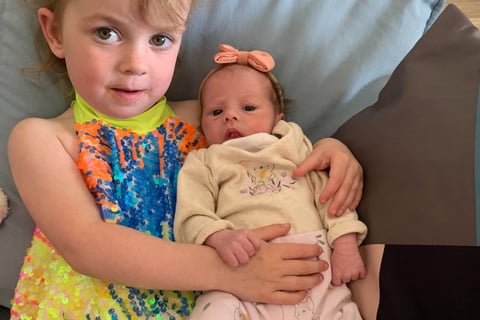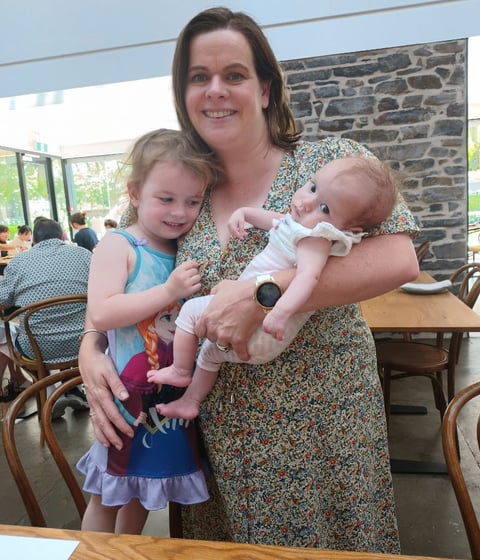From Meltdowns to Milestones: Parenting Through Autism, Anxiety, and New Beginnings
Bringing home a new baby is always a life-changing experience, but for our family, it triggered an entirely new journey—one we never anticipated. In this post, I share how the arrival of our youngest uncovered a deeper challenge with our middle child’s emotional regulation, ultimately leading us to seeking autism diagnosis. Navigating the mix of anxiety, meltdowns, and the overwhelming love for a new baby, this is a candid look at the highs, lows, and everything in between. If you're a parent balancing multiple needs, this story is for you.
10/8/20243 min read




loving her baby sister


Preschool days
A fancy restaurant in her pj's
Adjusting to new siblings can be a challenge
We are a family of five, and when Averley was born, we knew it would be a big adjustment for her older sisters, Cadence and Mackenzie. We hadn’t anticipated adding to our family after Mackenzie, as we were told that the likelihood of another child was minimal. But, as life often does, it surprised us—Averley had her own plans! The girls were over the moon with excitement about the arrival of their baby sister, but for Mackenzie, it presented some unexpected challenges.
Mackenzie had grown accustomed to having me all to herself. While she did attend childcare when I worked, COVID meant she spent a long period at home with me. Unlike Cadence, who took to childcare easily, Mackenzie was always my more sensitive, clingy little koala.
As my pregnancy progressed, we noticed that Mackenzie became more anxious. She was increasingly distressed at drop-offs, and wary of strangers or even familiar faces she didn’t see often. At the time, we chalked it up to the changes of a new sibling on the way, but deep down, I sensed there was more going on.
When we brought Averley home, we made a special effort to ensure Mackenzie had her own exciting experiences. We tried all the usual tricks: one-on-one time, special toys during feeding, and activities reserved for when I needed to tend to the baby. But nothing seemed to ease her distress. Mackenzie was struggling. Her little world had been turned upside down, and her behaviour became increasingly challenging. She stopped sleeping well, took hours to settle at night, had emotional meltdowns, and clung to me constantly.
Starting preschool that same year, we worked hard to create calming routines, but Mackenzie’s anxiety only escalated. Then, one day, she climbed over a fence at preschool, desperate to chase after me as I left. That was the turning point—I knew we needed help.
Thankfully, I had support. I booked an appointment with our GP and spoke to the preschool director, both of whom took my concerns seriously—a blessing, considering how often parents are dismissed. Mackenzie was referred to a paediatrician and occupational therapy. When we saw the paediatrician, my feelings were validated, and we were referred to the NDIS Early Intervention program. This was a game changer—it confirmed that Mackenzie needed support beyond what I could give her.
Looking back, while my first thoughts weren’t about autism, I can now see the signs, especially in how many of her sensory needs were unmet. Thanks to our medical team’s support, Mackenzie was able to access the NDIS Early Intervention program. For children under six, this provides crucial support even without a formal diagnosis. It has allowed us to set up the services she needs to thrive, and the difference has been life-changing for our whole family.
If you are struggling with knowing whether your children's behaviours are beyond adjustment consider the following:
Intensity of behaviours (high, medium, low)
Length of meltdown
Feelings and demeanour after coming out of a meltdown
Frequency of high level behaviours
Aggression?
Can you divert the attention?
Any possible consistent triggers
Methods that do and do not work in trying to regulate a meltdown
Strategies that you have implemented
Family history
Any traumatic experiences (For us, Mackenzie did not like Dr's as she had experienced some medical trauma during COVID)
Developmental Issues (toileting, play with other children, play with older or younger children, gross motor skill, fine motor skill, communication both expressive and receptive, eating and diet)
Clothing preferences or an inability to regulate temperatures (wearing a tshirt and shorts during winter or jumpers and track pants in summer)
While this list is not exhaustive, it has been some of the questions that we have been asked multiple times.
Helpful Links
https://www.ndis.gov.au/understanding/families-and-carers/early-childhood-approach-children-younger-9
https://autismsa.org.au/
